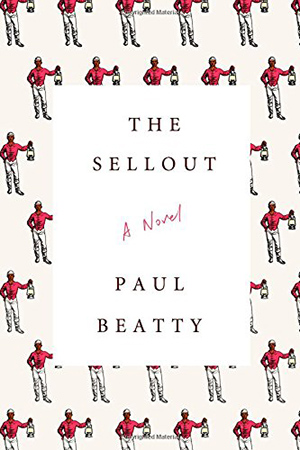Man Booker Prize Goes to Paul Beatty
BU alum the first American ever to win British award

Paul Beatty (CAS’84, GRS’87) is the first American to receive one of the world’s top literary honors—the Man Booker Prize for Fiction. He received the award for his novel The Sellout, a stinging satire on race and class, at a ceremony in London October 25. Photo by John Phillips/Pool photo via AP
One of the world’s most respected literary awards—the Man Booker Prize for Fiction—has been awarded for the first time to an American writer, BU alum Paul Beatty (CAS’84, GRS’87). Beatty was unanimously selected for his blowtorch-hot satire on race in America, The Sellout (Farrar, Straus and Giroux, 2015).
At a ceremony in London on Tuesday, the 54-year-old New York writer received a trophy and a check for £50,000 (about $61,000). He received another £2,500 (about $3,000) for making the short list of finalists. The Royal Mail, the British postal service, issued a congratulatory postmark that will be applied to millions of items of stamped mail this week, saying “Congratulations to Paul Beatty, winner of the 2016 Man Booker Prize.”
The real prize may be the increased sales and recognition the award will bring for Beatty’s scathing and hilarious novel. While critics extolled The Sellout when it was published, and it won the 2015 National Book Critics Circle Award in Fiction, the book has yet to become a best seller.
Shot through with profanity and liberal use of the N-word, The Sellout landed with a bang, its publication coinciding with the nationwide controversy over police shootings of black men across the United States and the launch of the Black Lives Matter movement.
“It was a hard book for me to write; I know it’s hard to read,” Beatty said at the prize ceremony. “I’m just trying to create space for myself. And hopefully that can create space for others.”
 As The Sellout opens, its African American narrator, an urban farmer and artisan weed dealer, has been hauled before the Supreme Court for offenses that include trying to resegregate his hometown of Dickens, Calif., and reinstate slavery with the help of his sidekick, the last surviving Little Rascal, Hominy Jenkins.
As The Sellout opens, its African American narrator, an urban farmer and artisan weed dealer, has been hauled before the Supreme Court for offenses that include trying to resegregate his hometown of Dickens, Calif., and reinstate slavery with the help of his sidekick, the last surviving Little Rascal, Hominy Jenkins.
The book recounts the sometimes agonizing journey that led the narrator to this point—his father, a social scientist, was shot dead by police on a street corner—in terms that has earned Beatty comparisons to figures from Jonathan Swift to Richard Pryor and Chris Rock. Dwight Garner’s New York Times review says: “The first 100 pages of [Beatty’s] new novel, The Sellout, are the most caustic and the most badass first 100 pages of an American novel I’ve read in at least a decade.”
Historian Amanda Foreman, chair of the five-judge Man Booker panel, calls The Sellout “a novel for our times. A tirelessly inventive modern satire, its humor disguises a radical seriousness. Paul Beatty slays sacred cows with abandon and takes aim at racial and political taboos with wit, verve, and a snarl.”
Beatty, who earned bachelor’s and master’s degrees in psychology at BU, is the author of three other novels and two books of poetry. (He was named Grand Slam Champion of the Nuyorican Poets Café in 1990.) He is also the editor of Hokum: An Anthology of African-American Humor (Bloomsbury, 2006).
First bestowed in 1969, the Man Booker Prize was initially known as the Booker Prize. It has been sponsored by the Man Group, a large investment management firm, since 2002. Until 2014, only authors from Britain, Ireland, and the Commonwealth nations were eligible, and the decision to open the competition up to any novel published in Britain was controversial. Last year’s winner was Jamaican-born Marlon James, for A Brief History of Seven Killings, a novel about the attempted assassination of musician Bob Marley. Among past winners are Salman Rushdie, Iris Murdoch, Hilary Mantel, Kazuo Ishiguro, and Michael Ondaatje.

Comments & Discussion
Boston University moderates comments to facilitate an informed, substantive, civil conversation. Abusive, profane, self-promotional, misleading, incoherent or off-topic comments will be rejected. Moderators are staffed during regular business hours (EST) and can only accept comments written in English. Statistics or facts must include a citation or a link to the citation.